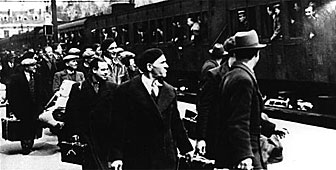
Jewish groups welcome latest Bergier reports

Jewish leaders have welcomed the latest batch of independent reports into Switzerland's wartime role, in particular the treatment of refugees.
“We cannot rejoice at the findings,” says Alfred Donath, head of the Swiss Federation of Jewish Communities. “But we’re satisfied that, despite the pressure on the Bergier commission, they’ve done their work honestly, and they haven’t been afraid to tell the truth.”
While the exercise has been broadly welcomed, voices on the right of the political spectrum have accused the Independent Commission of Experts (ICE), led by the historian Jean-François Bergier, of wanting to tarnish Switzerland’s reputation.
Switzerland’s reputation took a battering over the country’s wartime role during the 1990s, particularly over the banks’ role in handling assets looted by the Nazis and dormant accounts held by Holocaust victims.
“Switzerland has done well in accepting that its image is less brilliant than it was, and it will take lessons from that,” Donath told swissinfo. He points out that no other country has done as much as Switzerland to get to the truth about its wartime role.
Well-balanced
“This report is critical, but it is not extreme. It is well balanced. We have just tried to put the facts on the table,” says Jacques Picard, one of the historians on the commission.
On the issue of Switzerland’s treatment of refugees, he points out that the report highlights not only those refugees who were turned away, but also the thousands who were allowed into Switzerland.
“If you show the shadows as well as the light, you are preparing the ground for a more open future,” Picard adds.
The report on refugees was one of ten released in Bern on Thursday by the ICE, which was established in 1996 to investigate Switzerland’s behaviour in the period between 1933 and 1945.
As well as the refugee issue, the commission has looked into Switzerland’s policy towards the gypsies, the question of dormant accounts, the Swiss legal system and industrial and financial dealings with Nazi Germany.
The final analysis on refugee policy is largely similar to the preliminary report published in December 1999, and it makes for uncomfortable reading.
Anti-Semitism
By the summer of 1942, the report says, the government would have known that refugees who were turned away at the border risked being transported to the Nazi death camps.
Yet in August of that year, the government ordered Switzerland’s borders closed to people fleeing persecution “for racial reasons only”.
The report says Switzerland’s wartime refugee policy was driven largely by anti-Semitism, and that racist criteria established by the Nazis was used to decide who should be allowed into the country.
This was most vividly demonstrated by the decision in 1938 to stamp the passports of German Jews with a red letter “J”.
“I’ve been saddened by the fact that anti-Semitic feeling was so strong,” says Donath. “I was not aware that it was so deep in the mentality of the Swiss, and especially of the government, and that it had influenced policy so much.”
The commission suggests that neither food shortages nor military or political pressure from abroad played a key role in Switzerland’s decision in 1942 to close its borders to people persecuted purely on racial grounds.
It also criticises the harsh living conditions and restrictions imposed on refugees in Swiss internment camps, and the decision not to accept payments for them from organisations in the United States in 1942 and 1943.
Humanitarian traditions
In contrast to the policies of the authorities, many officials and ordinary Swiss citizens did help and defend Jewish refugees, the report says. These people, it seems, were upholding Switzerland’s humanitarian traditions at the risk of being caught and punished.
There are those who believe that Switzerland, surrounded as it was by the Axis powers, had little option but to cooperate with the Nazis, and that the very real prospect of a German invasion justified the government’s behaviour.
“These weren’t easy decisions for them, but the general impression remains that they could have done more for refugees in a humanitarian way, especially after they knew what was going to happen to them,” Donath says.
There is no doubt that the Bergier reports have shattered many of the illusions the Swiss had about themselves. Jacques Picard points out that it was the Swiss themselves who promoted the idea of a humanitarian tradition.
“Switzerland clearly failed to live up to the standards it had set itself,” he told swissinfo.
Lessons for today
The Holocaust and the refugee issue have long been treated in a cursory way by Swiss history textbooks. Alfred Donath is not alone in hoping that the work of the Bergier commission will be used to update what is taught to Swiss youngsters in future.
The Swiss government has twice apologised for its refugee policies during the Second World War, in 1995 and 1999. But Donath believes what happened between 1933 and 1945 has another important lesson for the federal authorities: “Refugee policies are still rather restricted today, and we are still confronted with many refugees, many of whom are discriminated against or in danger.
“We would support a much more open policy towards refugees because of what has happened to us,” he adds.
by Roy Probert

In compliance with the JTI standards
More: SWI swissinfo.ch certified by the Journalism Trust Initiative





























You can find an overview of ongoing debates with our journalists here . Please join us!
If you want to start a conversation about a topic raised in this article or want to report factual errors, email us at english@swissinfo.ch.